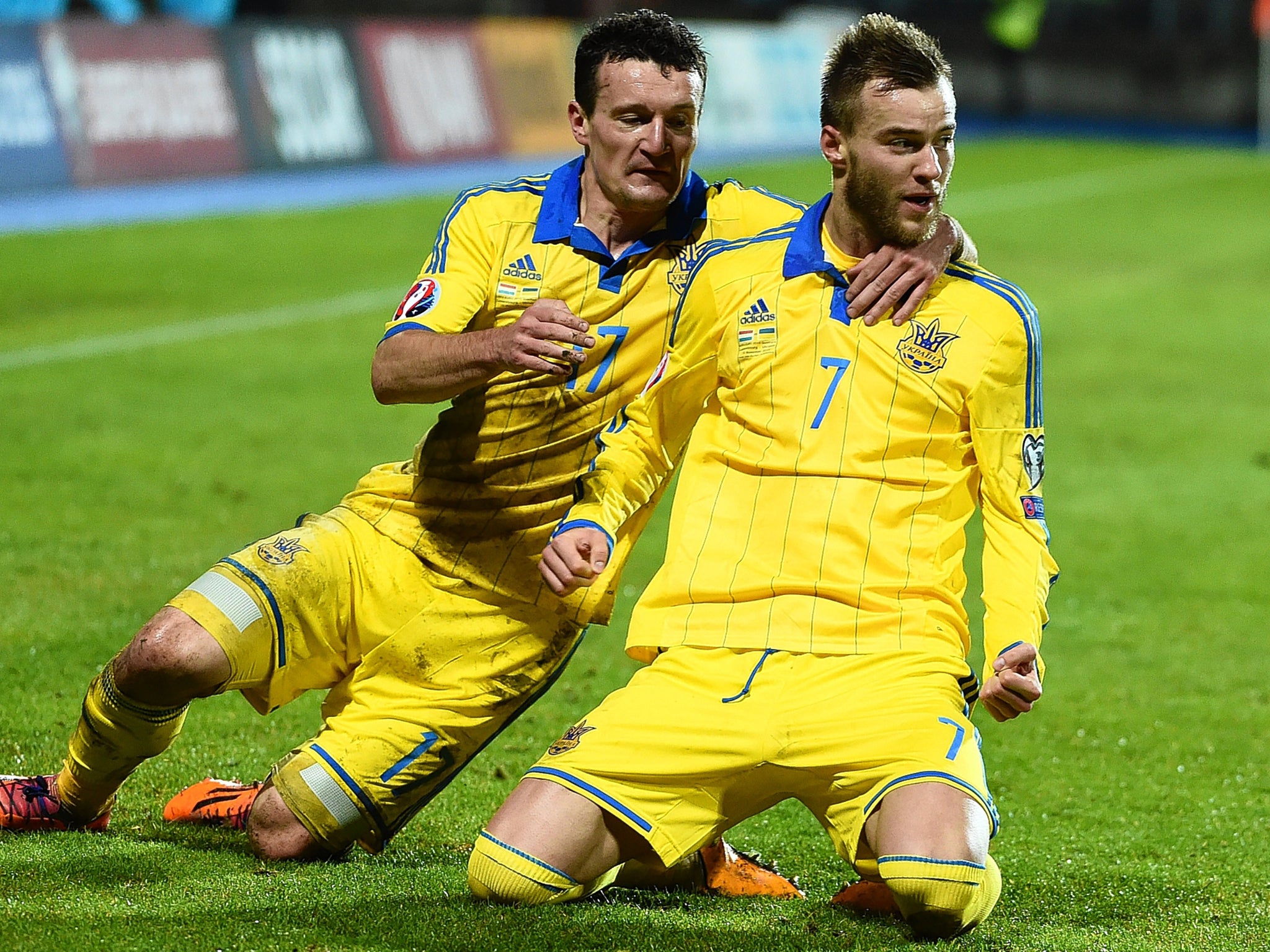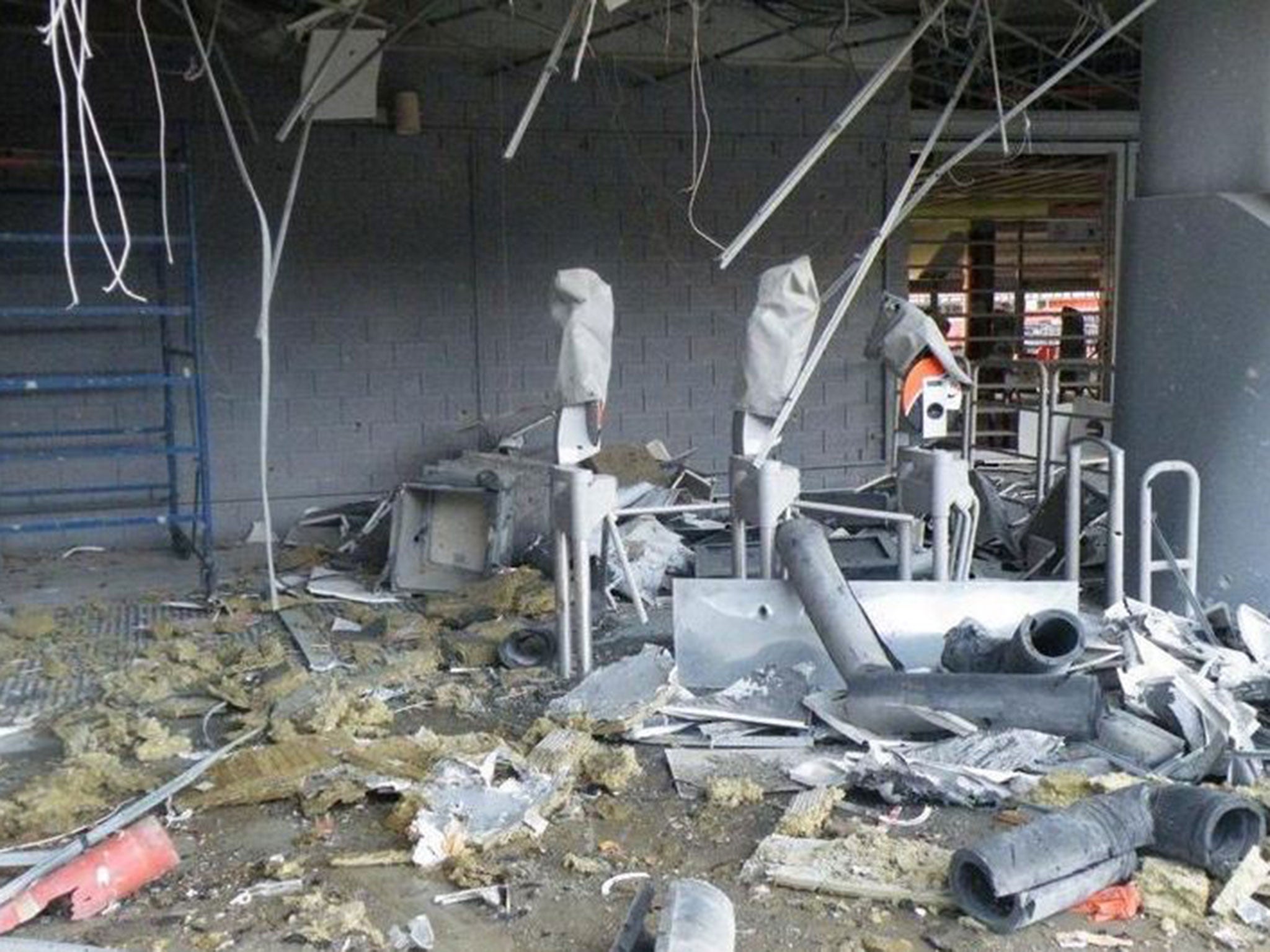Euro 2016 play-offs preview: Ukrainians seek relief from their troubles
As the former rising power in the East sets out tonight on a revenge mission against Slovenia, Jack Pitt-Brooke considers how a war-torn country is hoping to find some consolation for its woes on the field of sporting conflict

Your support helps us to tell the story
From reproductive rights to climate change to Big Tech, The Independent is on the ground when the story is developing. Whether it's investigating the financials of Elon Musk's pro-Trump PAC or producing our latest documentary, 'The A Word', which shines a light on the American women fighting for reproductive rights, we know how important it is to parse out the facts from the messaging.
At such a critical moment in US history, we need reporters on the ground. Your donation allows us to keep sending journalists to speak to both sides of the story.
The Independent is trusted by Americans across the entire political spectrum. And unlike many other quality news outlets, we choose not to lock Americans out of our reporting and analysis with paywalls. We believe quality journalism should be available to everyone, paid for by those who can afford it.
Your support makes all the difference.Overnight, around the block and in the cold, Ukraine fans queued for tickets for this evening’s game. When the tickets sold out, they blocked the main road to the stadium in protest. Their national team hosts Slovenia on Saturday, aiming for a place at Euro 2016, revenge against the side who beat them to Euro 2000, and a rare moment of hope for a country in need of one.
This should have been the decade of Ukrainian football ascendancy. Ukraine could plausibly have moved ahead of Russia and Turkey as the best domestic competition outside Western Europe. It had the stadiums, newly built for Euro 2012. It had the money to import high-quality footballers from Brazil and beyond. There was a talented new generation of Ukrainian players, still based at home, providing an exciting future for the national team.
Over the last two years, history has intervened. Ukraine has overthrown a president, been at war, and lost control of the Crimea and Donbass regions. The economy has struggled and the currency, the hryvnia, has collapsed. Thousands of Ukrainians have been killed, including volunteers drawn from football clubs’ hardcore support. The human cost and the football cost are not comparable, but the hopes many had for the Ukrainian Premier League are in ruins.
The Donbass Arena, the shining pride of eastern Ukraine, was damaged by shelling, forcing Shakhtar to relocate from Donetsk to Lviv, 640 miles away. Shakhtar sold their best players, Luiz Adriano and Douglas Costa, and lost the title last year.

Dynamo Kiev won last year’s Premier League but lost the financial backing of Nadra Bank, owned by Dmytro Firtash, who was close to the ousted regime of Viktor Yanukovych. They have lost big players, although succeeded in persuading Andriy Yarmolenko to sign a new deal last month. Dnipro Dnipropetrovsk, last season’s surprise Europa League finalists, lost their best player, Yevhen Konoplyanka, to Sevilla this summer.
Despite all this, the Ukraine national team remains resilient and competitive. The veteran coach Mykhaylo Fomenko is not wildly popular, because of his conservative selection and tactics, but his team performed solidly in qualification, finishing third in Group C behind Spain and Slovakia. He has a well-balanced squad, founded on the experience of goalkeeper Andriy Pyatov and midfielders Oleh Husyev and Anatoliy Tymoshchuk. At 36, Tymoshchuk has a remarkable 140 Ukraine caps; he left Zenit St Petersburg for Kazakh side Kairat in the summer after being criticised in Russia for visiting hospitalised Ukrainian soldiers.
There are promising midfielders in Dynamo pair Denys Harmash and Serhiy Rybalka, but the real stars are on the flanks. Yarmolenko is an incisive, imaginative winger who has been admired by English clubs for years. Konoplyanka is the best Ukrainian player of his generation, who could have gone almost anywhere in Europe last summer and was brilliant in Sevilla’s 3-2 defeat of Real Madrid last week.
Between Konoplyanka and Yarmolenko, Ukraine have more than enough individual quality to beat Slovenia, but they are very aware of an important warning from history. In 1999 Ukraine met Slovenia in a play-off to reach Euro 2000. Neither side had played in a major tournament since independence, which both countries achieved in 1991. Ukraine, with a proud footballing tradition, a population of 45 million and Serhiy Rebrov and Andriy Shevchenko up front, were big favourites.
That time, 16 years ago yesterday, the first leg was in Ljubljana. It was 1-1 going into the final minutes, when goalkeeper Oleksandr Shovkovskiy skewed a kick and Milenko Acimovic beat him from the halfway line. The second leg, in Kiev, was drawn 1-1. Ukraine had to wait until the 2006 World Cup to reach their first tournament as an independent country. Some have never forgiven Shovkovskiy, who still plays for Dynamo Kiev.
“It is now very much about revenge and the subconscious fear that Ukraine will step on the same rake,” Ukrainian journalist Oleksandr Tkach told The Independent.
Having played at only two major tournaments – and one of those as co-hosts – it certainly feels as if Ukraine have underachieved since independence. They have the population, the talent, the big clubs and the history to make their presence felt.
As recently as five or even three years ago, the success of Euro 2012 and the big spending of Shakhtar made a Ukrainian football emergence feel plausible. But now Ukraine is in crisis and top-flight football is no longer played in the east of the country. The national team now plays only in Kiev and Lviv. The game will be at the Arena Lviv, a Euro 2012 stadium currently used by Shakhtar Donetsk.
Lviv is probably Ukraine’s most European-facing city, just an hour’s drive from the Polish border. Ukrainian, rather than Russian, is the main language spoken. Ukraine flags fly from most windows. Toilet roll adorned with the Russian President Vladimir Putin’s face is sold on the streets. Nowhere is more behind this team than Lviv.
“There are not many things now in Ukraine that can really bring joy and make many people forget about the war and hardships at least for a while,” said Alex Sereda, another Ukrainian journalist. “The Ukraine national team may become one.”
Fans from across the country have headed west in great numbers for this game, for the chance to see their team take revenge on Slovenia, to make it to France next year – and for national pride.
Join our commenting forum
Join thought-provoking conversations, follow other Independent readers and see their replies
Comments